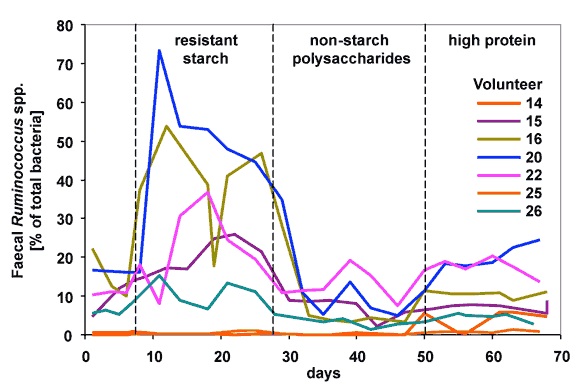One size doesn't fit all! Differences between individuals and the potential implications for dietary health effects
Published on 17 February 2011 in Food, health and wellbeing

Introduction
It is becoming increasingly apparent that the type of diet people consume influences their health status. An adequate intake of all the required nutrients is essential to sustain the basic bodily functions, but certain foods can also trigger health effects beyond the basic needs. For example, fruit and vegetables contain many secondary compounds that can help in preventing various diseases, including heart disease and cancer. Some of the health-promoting effects of foods involve the action of bacteria resident in the large intestine, the gut microbiota. They degrade dietary carbohydrates that are indigestible in the upper gut to fermentation acids that provide energy to the host. Some of those acids, in particular butyrate, also elicit anti-inflammatory and anti-carcinogenic effects. Two major classes of indigestible carbohydrates in foods are resistant starch, which is mainly found in potatoes, rice and corn, and non-starch polysaccharides mainly found in cereals and fruit and vegetables.
Investigating the effect of different dietary intakes on human health is an active research area, and many studies have identified certain foods or food constituents that show a significant health-promoting effect. However, these differences are normally expressed as the average response of the whole study group of volunteers. When looking at the data of each individual, it is often found that certain volunteers do not follow the same trend as the majority. The question is therefore whether the same dietary advice is in the best interest for those individuals, or whether we need to personalise nutritional advice in a similar manner as is currently being discussed in the medical sector.
Key Points
- Dietary intakes can play an important role in maintaining human health, however, the response of individuals to specific food ingredients can vary considerably from the effect seen in the population as a whole.
- Differences between individuals are rarely taken into consideration when formulating advice on healthy diets, and more research is needed to understand the consequences of those differences for human health.
Research Undertaken
Human dietary intervention studies carried out are the Rowett Institute of Nutrition and Health have revealed that diet can have a profound effect on the human gut microbiota. For example, a recent study that compared the effect of a diet rich in resistant starch to one high in non-starch polysaccharides revealed that the resistant starch intake led to significant changes in several groups of bacteria1. The most dramatic effects were seen for bacteria related to Ruminococcus species. However, two of the volunteers harboured extremely low numbers of this bacterial group and showed no increase on the resistant starch diet (Fig. 1). Interestingly, the same two volunteers digested less than 40% of the resistant starch ingested on the resistant starch diet, while all other volunteers completely digested the dietary resistant starch1. It therefore appears that the carriage of Ruminococcus-related bacteria is important to achieve colonic digestion of resistant starch, and people lacking this bacterial group in the colon are unlikely to receive the same benefits from eating starchy foods as the majority of the population. For example, the supply of health-promoting fermentation acids from bacterial starch breakdown is likely to be lower.
Profound differences between individuals in the composition of the gut microbiota and their response to dietary intakes have also been found in other human intervention studies. Future research will investigate the potential consequences for human health and alternative nutritional strategies for those individuals deviating from the normal behaviour.

Fig. 1: Human faecal levels of Ruminococcus species in response to a diet high in resistant starch or non-starch polysaccharides1. Volunteers consumed a standard diet at the beginning of the study and a high-protein medium carbohydrate diet at the end.
Policy Implications
A scientific understanding of the mechanisms underlying the health-effects of food components is critical for the formulation of dietary advice to the public, as well as for the development of novel functional foods. A better understanding of inter-individual differences in response to foods is crucial for the development of novel strategies for personalised nutritional advice.
Reference
1Walker AW, Ince J, Duncan SH, Webster LM, Holtrop G, Ze X, Brown D, Stares MD, Scott P, Bergerat A, Louis P, McIntosh F, Johnstone AM, Lobley GE, Parkhill J, Flint HJ (2011) Dominant and diet-responsive groups of bacteria within the human colonic microbiota. ISME J 5: 220-230.
Author
Petra Louis p.louis@abdn.ac.uk







